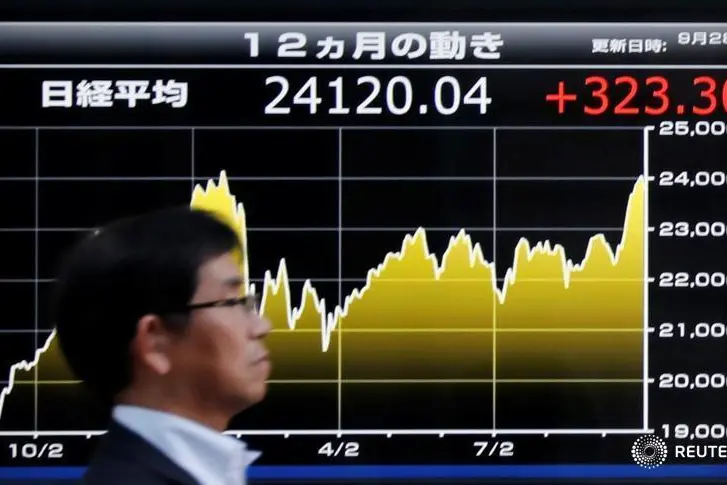PHOTO
SINGAPORE: Stocks were subdued on Friday, apart from standout gains in Japan, as an artificial intelligence rally took a breather and as time ticked out on high-stakes talks to avoid a U.S. debt default.
MSCI's broadest index of Asia-Pacific shares outside Japan drifted 0.3% higher in trade thinned by a holiday in Hong Kong. The index is down 1.6% on the week.
Japan's Nikkei, by contrast, rose 0.7% and is riding momentum from foreign inflows and basking in the afterglow of revenue and production upgrades for U.S. chipmaker Nvidia that have set Japanese firms with exposure soaring.
The Nikkei is up 0.7% on the week, too, for a seventh weekly gain in row - its longest weekly winning streak in five years and one which has added some $460 billion to Japanese stocks.
May data on Friday showed inflation slowing to 3.3% in Tokyo, a decent proxy for the nation, which means it's been comfortably above the Bank of Japan's 2% target for a year now. The world's third largest economy has struggled for decades to get meaningful and sustained rises in prices, profits and wages.
"The pandemic has brought with it an unprecedented string of inflation drivers for Japan," said analysts at Nomura, who noted households are spending and have upgraded stock forecast ranges.
"These forces have brought about a tectonic shift in the price-setting behaviour of Japanese companies, and thus an improvement in their profit margins."
A weak yen has also been helping flatter Japanese exporters' accounts and though it crept to the stronger side of 140 per dollar on Friday it is down 1.4% this week as worry about a possible U.S. debt default has the dollar surging.
The dollar is up about 0.7% on the euro for the week and last traded at $1.0730 on the common currency. The U.S. dollar index touched a three-month high of 104.31 overnight and was last at 104.16, up 0.9% on the week.
CEILINGS
U.S. President Joe Biden and top congressional Republican Kevin McCarthy are closing in on a deal to raise the United States government's $31.4 trillion debt ceiling for two years, a U.S. official told Reuters, but time is running short.
The U.S. Treasury estimates it'll run out of funds within a week and legislating any deal will take that down to the wire.
Prices for Treasury bills maturing on the so-called X-date of June 1 recovered overnight with hopes for a breakthrough, while the rest of the curve was under pressure as investors have also been worrying U.S. rates will go higher.
Two-year yields hit a 2-1/2 month high of 4.552% in Asia on Friday, up 24 basis points on the week.
The New Zealand dollar has been a big loser on the week, diving 3% to test 60 cents as nerves about higher U.S. rates have come together with New Zealand's central bank all but calling time on rate hikes at its meeting on Wednesday.
The kiwi was last at $0.6077.
China's yuan has been the other notable casualty and has slid along with Chinese stocks as the shine comes off expectations of a booming post-pandemic recovery.
The yuan is down three week in a row and has lost about 0.8% this week to touch troughs not seen since China remained in the grip of COVID lockdowns late last year. It was last at 7.0679 to the dollar.
"The U.S. debt issues are not the only 'ceiling' that we are dealing with, as a slowdown in Chinese economic data suggests that a ceiling for growth may be forming as well," said RBC technical strategist George Davis.
"This is exhibited by a not only a decline in Chinese stocks and (the yuan), but also through a selloff in copper and iron ore."
Shanghai copper hit a six-month low on Thursday and is down about 2.5% on the week. Singapore iron ore is down about 3% on the week. Brent crude futures have been steady around $76 a barrel. Spot gold is at $1,947 an ounce.
(Editing by Lincoln Feast)




















